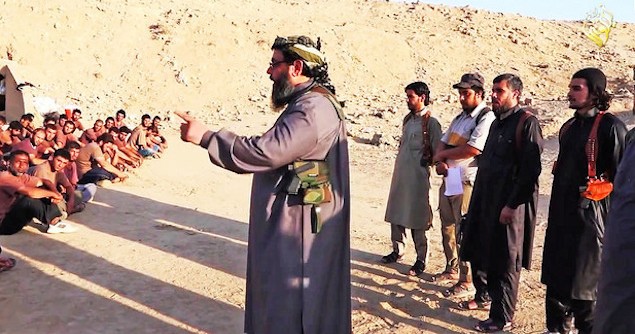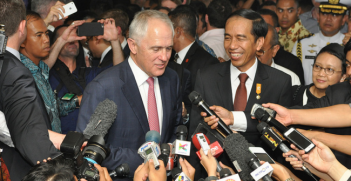Apocalyptic Erotica Now: The Allure of Islamic State Online

The suicide bombing death in Ramadi of Melbourne teenager Jake Bilardi has deepened public anxieties about the allure and reach of Islamic State (IS).
Western governments, security agencies and citizens – Muslim or otherwise – seem bewildered by the power of IS and its capacity to recruit and radicalise young Muslims. Near daily media reports of young western Muslims joining IS as fighters or warrior brides have fortified fears of further homegrown terror attacks like those in Paris and Copenhagen.
As with the Soviet-Afghanistan War, it is feared that a new generation of Islamist militants will return to the west and inflict their horrors on innocent civilians.
Yet, amid the calls for community vigilance and increased government surveillance and security legislation, there has been little genuine self-reflection in western nations. There has been, rather, a familiar, if discomforting, denial – not only about the military capacity of IS, but the very essence of its character, culture and appeal.
IS online
In particular, western governments and security agencies have only belatedly acknowledged the significant role of Islamic State’s media strategies in their military, PR and cultural successes. Extending the communication systems of Al-Qa’eda in the Arabian Peninsula, IS has developed a wide range of downloadable images, narratives and films which could be shared through various social media platforms.
Even where the platform managers shut down the IS accounts for content breaches, the militants simply create new identities and new accounts. Twitter accounts such as Markaz al-Islam, for instance, have been engaged in constant cat and mouse with western authorities and account managers.
As the cases of Jake Bilardi and the equally tragic Sydney teenager Amira Karroum demonstrate, western security agencies can often do little more than observe the game.
And while the Australian government is investing in the production of media counter-narratives, designed to neutralise the allure of IS propaganda, these efforts are unlikely to have much impact. That’s largely because Western governments not only misread Islamic State; they have a very limited understanding of the internet and its role within the private spaces, bedrooms and imaginaries of teenagers.
Security agencies and their propaganda, sadly, will be no match for the internet and teenagers’ journey to adulthood and sexual maturity.
Moreover, governments and their agencies continue to believe, somewhat uncritically, that IS represents a perversion of Islam and its place within the social progress and discourses of pluralism that the West propagates.
The view from the other side
Jake Bilardi saw it differently.
He saw a pernicious and cruel western world that was governed by material greed, violent hierarchies and moral vicissitude. In his own bleak vision, a vision accentuated no doubt by the death of his mother, Islam presented the only viable alternative to a world in decay.
And while many Muslims and non-Muslims insist that IS and other militant organisations have perverted their faith, there can be no doubt that Jake Bilardi found deep solace and hope in the apocalyptic and messianic potential of Islam. Jake clearly embraced the Qu’ranic notion of “Appointed Time”.
Paradoxically, perhaps, this same apocalyptic thread runs through all the Abrahamite religions, including Judaism and Christianity. Even within the ascent of secularism, apocalypse and conceptions of collective doom remain a powerful force in the imaginings and narratives that pervade western cultural identity and self-conceptions.
Apocalypse now
It is, in fact, a principal feature of our conflict narratives and dramatic motifs.
Consider, for example, popular TV series such as The Wire and Game of Thrones, video games like Blue Estate, and films like Tarantino’s Django Unchained.
Consider, also, the ways in which our news is structured, and the political debates which are perennially laced by visions of social, economic and ecological collapse.
At its most obvious, we can see that IS has mimicked the style and force of these heroic and erotic apocalyptic narratives. An examination of the IS images and narratives reveals the same masculinist potency as Hollywood thrillers.
Combined with powerful panegyrics of struggle and justice, these narratives provide for young people a site for self-projection and constellation. Like the images of any western celebrity, the IS warrior is attractive and potent, fighting against the dark forces of western calumny and injustice.
In this sense, IS resembles much of what is also inscribed in western thinking and cultural knowledge, including a sense that war in the Middle East is an apocalyptic battle between Good and Evil. Like IS, the west fortifies its claims to moral and political legitimacy through the invocation of a transcendental and historical destiny.
Islamic State’s supposed “traditionalism” is little different to the Australian government’s exaltation of Gallipoli and other historical events which are designed to ground a sense of nation and national purpose in the deep past.
It is, therefore, simply a misreading of IS to see them as vastly different to ourselves and how we engage with the political world. They are not traditionalists reacting against modernisation. Nor are they simply the stereotypes depicted in every Hollywood film since 9/11.
The most terrifying thing about IS and its supporters are that they are struggling with modernisation and globalisation like most other peoples of the world.
The answer to these current horrors, then, is to be found in an honest interrogation of ourselves. For most of us, Jake Bilardi died a fatuous, frightening and tragic death. He frightens us not only because he might have committed some heinous crime in Australia, but because he is so close to us.
If we are to understand IS and its dark vision, we need to look more directly at ourselves and how we imagine the world.
Our media tells our stories. They tell us who we are and how we think. Jake asked significant questions, and while we might reject his answers, we should nevertheless have the courage to name those questions and address the terror that we are creating.
We need to know ourselves before we can fully understand IS and the essence of its allure.
Jeff Lewis is a Professor of Media and Cultural Politics at RMIT University. This article was originally published in The Conversation on 13 March 2015. It is republished with permission.





